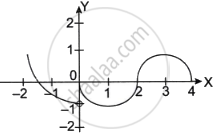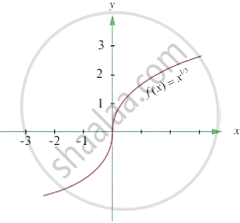Advertisements
Advertisements
प्रश्न
Using mathematical induction prove that `d/(dx) (x^n) = nx^(n -1)` for all positive integers n.
उत्तर

APPEARS IN
संबंधित प्रश्न
Find the values of p and q for which
f(x) = `{((1-sin^3x)/(3cos^2x),`
is continuous at x = π/2.
Examine the continuity of the function f(x) = 2x2 – 1 at x = 3.
Prove that the function `f(x) = x^n` is continuous at x = n, where n is a positive integer.
Find all point of discontinuity of f, where f is defined by `f (x) = {(2x + 3, if x<=2),(2x - 3, if x > 2):}`
Find all points of discontinuity of f, where f is defined by `f(x) = {(x^3 - 3, if x <= 2),(x^2 + 1, if x > 2):}`
Show that the function defined by g(x) = x = [x] is discontinuous at all integral points. Here [x] denotes the greatest integer less than or equal to x.
Examine the continuity of f, where f is defined by `f(x) = {(sin x - cos x, if x != 0),(-1, "," if x = 0):}`
Find all the points of discontinuity of f defined by `f(x) = |x| - |x + 1|`.
Show that the function f(x) = `{(x^2, x<=1),(1/2, x>1):}` is continuous at x = 1 but not differentiable.
Test the continuity of the function on f(x) at the origin:
\[f\left( x \right) = \begin{cases}\frac{x}{\left| x \right|}, & x \neq 0 \\ 1 , & x = 0\end{cases}\]
Prove that the function
Find the points of discontinuity, if any, of the following functions:
Find the points of discontinuity, if any, of the following functions: \[f\left( x \right) = \begin{cases}x^{10} - 1, & \text{ if } x \leq 1 \\ x^2 , & \text{ if } x > 1\end{cases}\]
Find the point of discontinuity, if any, of the following function: \[f\left( x \right) = \begin{cases}\sin x - \cos x , & \text{ if } x \neq 0 \\ - 1 , & \text{ if } x = 0\end{cases}\]
Show that the function `f(x) = |x-4|, x ∈ R` is continuous, but not diffrent at x = 4.
Prove that `1/2 "cos"^(-1) ((1-"x")/(1+"x")) = "tan"^-1 sqrt"x"`
Show that the function f given by:
`f(x)={((e^(1/x)-1)/(e^(1/x)+1),"if",x,!=,0),(-1,"if",x,=,0):}"`
is discontinuous at x = 0.
`lim_("x" -> pi/2)` [sinx] is equal to ____________.
The number of discontinuous functions y(x) on [-2, 2] satisfying x2 + y2 = 4 is ____________.
Let f (x) `= (1 - "tan x")/(4"x" - pi), "x" ne pi/4, "x" in (0, pi/2).` If f(x) is continuous in `(0, pi/2), "then f"(pi/4) =` ____________.
The domain of the function f(x) = `""^(24 - x)C_(3x - 1) + ""^(40 - 6x)C_(8x - 10)` is
How many point of discontinuity for the following function in its. domain.
`f(x) = {{:(x/|x|",", if x < 0),(-1",", if x ≥ 0):}`
`f(x) = {{:(x^10 - 1",", if x ≤ 1),(x^2",", if x > 1):}` is discontinuous at
Sin |x| is a continuous function for
If functions g and h are defined as
g(x) = `{{:(x^2 + 1, x∈Q),(px^2, x\cancel(∈)Q):}`
and h(x) = `{{:(px, x∈Q),(2x + q, x\cancel(∈)Q):}`
If (g + h)(x) is continuous at x = 1 and x = 3, then 3p + q is ______.
If f(x) = `{{:((log_(sin|x|) cos^2x)/(log_(sin|3x|) cos x/2), |x| < π/3; x ≠ 0),(k, x = 0):}`, then value of k for which f(x) is continuous at x = 0 is ______.
Let α ∈ R be such that the function
f(x) = `{{:((cos^-1(1 - {x}^2)sin^-1(1 - {x}))/({x} - {x}^3)",", x ≠ 0),(α",", x = 0):}`
is continuous at x = 0, where {x} = x – [x], [x] is the greatest integer less than or equal to x.
If f(x) = `{{:((kx)/|x|"," if x < 0),( 3"," if x ≥ 0):}` is continuous at x = 0, then the value of k is ______.
The graph of the function f is shown below.

Of the following options, at what values of x is the function f NOT differentiable?
Consider the graph `y = x^(1/3)`

Statement 1: The above graph is continuous at x = 0
Statement 2: The above graph is differentiable at x = 0
Which of the following is correct?
